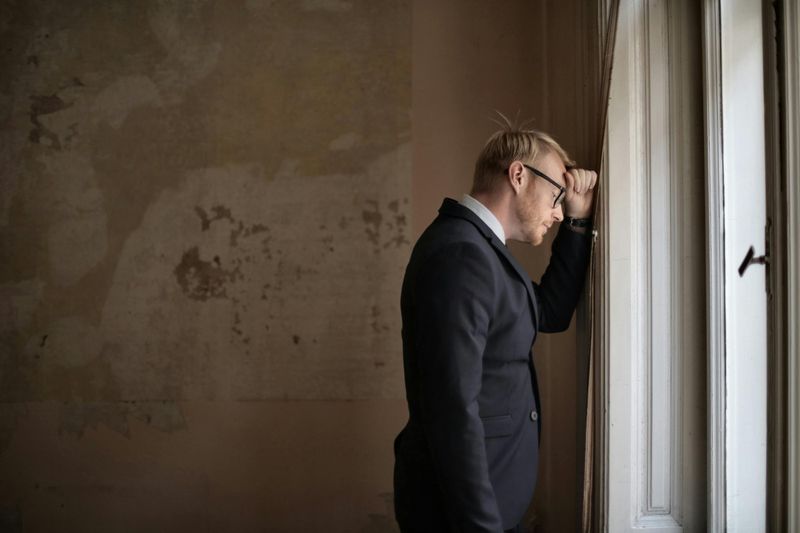10 Divorced Men Reveal the Moment They Knew Their Marriage Was Over

Divorce can be a profound and life-altering experience. For many, it’s not a single event but a series of moments that signal the end. In this article, ten divorced men share their deeply personal stories, revealing the precise instant they realized their marriages were over. These accounts provide a glimpse into the complexities of relationships, highlighting how small changes in behavior or unspoken words can signify the end of a partnership. Each story is unique, echoing the diverse emotional landscapes that accompany the dissolution of a marriage.
1. “When she stopped talking — not yelling, not arguing, just silence. That’s when I knew it was really over.”

Silence can be more telling than words. For one man, the absence of communication was deafening. Arguments and disagreements had once filled the air, but now there was only quiet. This transition from noise to silence was jarring, making the emptiness even more pronounced.
In relationships, silence can indicate emotional withdrawal. When the usual arguments cease, it might suggest that the connection has faded. This realization was a turning point, marking the end of a once-vibrant relationship.
The silence, once a respite, had become a sign of deeper issues. The lack of interaction was no longer comforting but isolating, signifying a profound disconnect.
2. “When she told me she felt more at peace when I wasn’t home.”

Hearing that your presence disrupts someone’s peace can be heartbreaking. For this man, his wife’s confession was a revelation. Her words were not angry or resentful, but calm and honest.
Realizing that being apart brought her peace was painful. It meant that the home, once a sanctuary, was now a place of discomfort. This moment was pivotal, as it illustrated a fundamental incompatibility.
Understanding that their togetherness brought unease, he recognized a growing emotional distance. Her candid admission was a stark reminder that the marriage had reached an impasse. The home had become just a house, devoid of warmth.
3. “When I realized I was rehearsing conversations in my head just to avoid a fight.”

Rehearsing conversations is often a sign of underlying fear. For this man, it became a routine to anticipate conflicts. The ease of open communication had evaporated, replaced by caution and strategy.
Each word carefully chosen, he found himself walking on eggshells. This behavior revealed a deep-seated anxiety about conflict and misunderstanding.
Realizing that he was preparing dialogues to prevent arguments highlighted the stress embedded in the relationship. This practice, once occasional, had become a necessity. It marked a significant shift in how he interacted, underscoring the emotional weight he carried daily.
4. “When she didn’t care that I forgot our anniversary. Not angry, not sad — just indifferent.”

Indifference can be more telling than anger. When he forgot their anniversary, he expected disappointment or irritation, but encountered apathy instead.
Her lack of response was unexpected, signaling a deeper issue. Indifference suggested that emotional investment had waned, and the milestone was no longer significant.
This moment was eye-opening. Her reaction, or lack thereof, spoke volumes about the state of their relationship. Celebrations that once mattered had lost their meaning, reflecting a profound disconnect. The absence of emotion was a clear indication that the bond they once shared had weakened.
5. “When I caught myself sitting in the car after work because I didn’t want to walk inside.”

Avoidance often speaks of underlying discomfort. For this man, the car became a refuge. The reluctance to enter his home was telling.
Lingering in the car was more than a pause; it was a reluctance to engage with the environment inside. Home, once a haven, now felt uninviting.
This realization was a turning point. The hesitance to enter highlighted a growing sense of alienation and unease. The car, symbolizing transition, became a space of reflection as he confronted the changing dynamics of his relationship.
6. “When she said, ‘I love you, but I’m not in love with you.’ I’d heard it in movies — never thought it’d be me.”

The distinction between loving someone and being in love can be profound. For this man, hearing those words was surreal, as if stepping into a movie scene.
The phrase, often dramatized in media, took on a personal and painful reality. It signaled a shift from romantic love to platonic affection.
Understanding this difference was a moment of clarity. The love between them had transformed, losing its romantic essence. It was a revelation that altered his perception of their relationship, marking the end of an era.
7. “When she started sleeping in the guest room ‘just to get better rest.’ That room became permanent.”

Sharing a bed is often symbolic of intimacy. When she moved to the guest room, it was framed as a necessity for rest.
However, the temporary arrangement became permanent, highlighting a desire for separation. The physical distance mirrored the emotional gap growing between them.
This change in sleeping arrangements was more than logistical. It signified a withdrawal from their shared life. The guest room, once a space for visitors, became a symbol of their fragmented relationship, emphasizing the divide that had quietly emerged.
8. “When I realized I was jealous of single friends — not for dating, but for having peace.”

Envy often reveals hidden desires. For this man, it wasn’t about the freedom to date but the tranquility that single friends enjoyed.
Observing their unencumbered lives, he recognized a longing for peace. It wasn’t about romantic pursuits but the absence of conflict and stress.
This realization was enlightening. It underscored a yearning for simplicity and serenity that his marriage no longer provided. The contrast between his life and theirs highlighted the emotional turmoil he faced, prompting a deeper reflection on his own situation.
9. “When she told our therapist she didn’t see a future for us. I was hearing it for the first time too.”

Therapy often uncovers hidden truths. For this man, the revelation came during a session when his wife expressed her doubts about their future.
Her words were unexpected, exposing a disconnect in their visions. The therapy session, intended for healing, became a moment of revelation.
Hearing her perspective for the first time in such a setting was startling. It highlighted a lack of communication and shared dreams. This acknowledgment marked a crucial juncture, presenting a truth that could no longer be ignored.
10. “When I looked across the dinner table and felt like I was sitting with a stranger.”

Familiarity can fade quietly over time. For this man, it was a simple dinner that revealed the change.
The person across the table, once a partner in every sense, now felt distant and unfamiliar. The shared meal, a daily ritual, became a moment of introspection.
This feeling of estrangement was profound. It marked the loss of connection and understanding that had once defined their relationship. The dinner table, a symbol of togetherness, now highlighted the isolation that had crept in.

Comments
Loading…